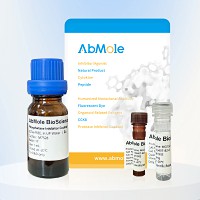All AbMole products are for research use only, cannot be used for human consumption.

R-Spondin-1 (Rspo-1) is a secreted protein,containing 2 FU(furin-like) repeats and 1 TSP type-1 domain and belonging to the R-spondin family. In mice, RSPO1 induces the rapid onset of crypt cell proliferation and increases intestinal epithelial healing, providing a protective effect against chemotherapy-induced adverse effects.
R-Spondin-1 (Rspo-1) acts both in the canonical Wnt/beta-catenin-dependent pathway and in non-canonical Wnt signaling pathway, probably by acting as an inhibitor of ZNRF3, an important regulator of the Wnt signaling pathway.
The recombinant mouse RSPO1 comprises 256 amino acids with a predicted molecular mass of 28.5 kDa.
Measured by the ability to induce activation of β-catenin response in a Topflash Luciferase assay using HEK293T human embryonic kidney cells, the ED50 is typically 0.1-0.9 μg/ml in the presence of 5 ng/mL recombinant mouse Wnt3a.
Endotoxin < 1.0 EU/μg
Lyophilized from sterile PBS, pH 7.4.
| Form | Lyophilized powder |
| Solubility (25°C) | Reconstitute the lyophilized powder in ddH2O or PBS to 100 μg/ml. |
| Storage | Stable for up to 12 months at ≤ -20°C. Upon reconstitution, the product should be stable for up to 1 week at 4°C or up to 3 months at -20°C. |
| Related Cytokines and Growth Factors Products |
|---|
| Recombinant Human GDF-15 Protein (HEK293 N-hFc)
Growth-differentiation factor 15 (GDF15), also known as MIC-1, is a secreted member of the transforming growth factor (TGF)-β superfamily. GDF-15 has a role in regulating inflammatory and apoptotic pathways in injured tissues and during disease processes. GDF-15 overexpression arising from an expanded erythroid compartment contributes to iron overload in thalassemia syndromes by inhibiting hepcidin expression. |
| Recombinant Human FGFR1 Protein (HEK293, C-His)
FGFR1, also known as CD331, is a full-length representative protein consists of an extracellular region, composed of three immunoglobulin-like domains, a single hydrophobic membrane-spanning segment and a cytoplasmic tyrosine kinase domain. |
| Recombinant Human FGFR2 Protein (HEK293, C-His)
FGFR2, also known as CD332, acts as cell-surface receptor for fibroblast growth factors and plays an essential role in the regulation of cell proliferation, differentiation, migration and apoptosis, and in the regulation of embryonic development. FGFR2 plays an essential role in the regulation of osteoblast differentiation, proliferation and apoptosis, and is required for normal skeleton development. It also promotes cell proliferation in keratinocytes and imature osteoblasts, but promotes apoptosis in differentiated osteoblasts. |
| Recombinant Mouse BMP-4 Protein (E. coli, C-His)
Bone Morphogenetic Protein-4 (BMP-4) is a critical signaling molecule required for the early differentiation of the embryo and establishing of a dorsal-ventral axis. BMP-4 is secreted from the dorsal portion of the notochord, and it acts in concert with sonic hedgehog to establish a dorsal-ventral axis for the differentiation of later structures. |
| Recombinant Human Coagulation Factor X (HEK293, C-Fc)
Coagulation factor X, belongs to the peptidase S1 family. Coagulation factor X is initially synthesized in the liver. Coagulation factor X is a vitamin K-dependent glycoprotein that converts prothrombin to thrombin in the presence of factor Va, calcium and phospholipid during blood clotting. |
All AbMole products are for research use only, cannot be used for human consumption or veterinary use. We do not provide products or services to individuals. Please comply with the intended use and do not use AbMole products for any other purpose.


Products are for research use only. Not for human use. We do not sell to patients.
© Copyright 2010-2024 AbMole BioScience. All Rights Reserved.
